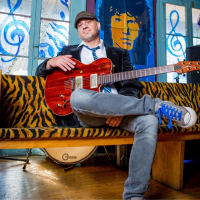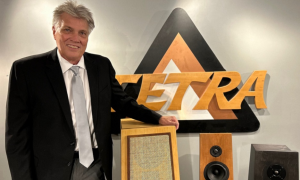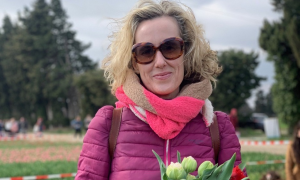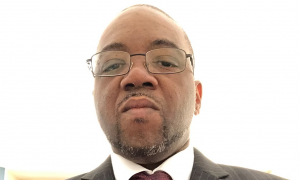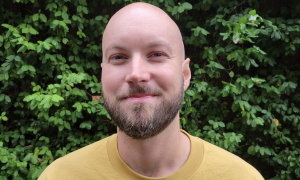Home » Jazz Articles » Chats with Cats » The Music Trustee: Dan Beck
The Music Trustee: Dan Beck
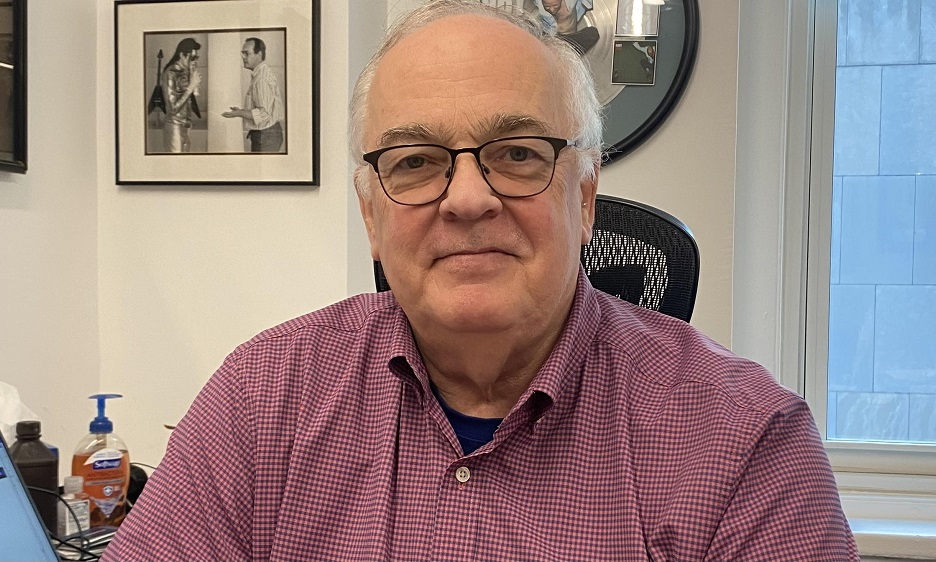
I always say that, in any town, people might have very different political and social ideals but put them all in a park with a band they’ll all get along
—Dan Beck
With a reputation like that, it's easy to be cynical about this industry. But, occasionally, it does get something right and, more astonishingly, doesn't always make it widely known.
Such is the case with the Music Performance Trust Fund (MPTF) whose motto is "enriching lives through music" and whose purpose is to help finance admission-free public concerts of varying genres around North America. And, it's all subsidized by the major record labels following a landmark collective bargaining agreement with the American Federation of Musicians.
In speaking to the head of this institution, I got to interview Dan Beck who holds a position I didn't know existed for this organization I had never heard of. He's worked at the top of the music business for decades but is now the sole trustee for the MPTF. It was fascinating to hear about his vast experience in the industry but also encouraging to know that there are still good forces in this business doing good things.
About Dan Beck
Dan Beck is a writer, a producer, a marketer, a manager, a mentor, and an investor in a long line of trusted relationships. He dedicated 20 years in building and supporting the images for dozens upon dozens of artists on the roster at Epic Records, as head of publicity, as a product manager and SVP of Marketing and Sales. He founded V2 Records in 1997, as President of North America, for Virgin entrepreneur and self-made brand Richard Branson. In 2002, he launched his own boutique entertainment marketing company, Big Honcho Media, LLC, a pioneer in social media marketing and promotion.Over those Epic years, he spearheaded marketing strategies for The Clash, Michael Jackson, Cyndi Lauper, Gloria Estefan, Sade, Luther Vandross, Pearl Jam, Stevie Ray Vaughan, The Charlie Daniels Band, Tammy Wynette, Charlie Rich, Cheap Trick, Ted Nugent, Living Colour, and Boston, among many others.
He's written songs with Hall of Famers Dion DiMucci and Felix Cavaliere. His hearing conservation film Listen Smart won the prestigious CINE Golden Eagle Award and was featured exhibit at the Rock & Roll Hall of Fame for over two years.
He became sole Trustee of the Recording Industry's Music Performance Trust Fund in 2013. The organization provides grants to pay professional musicians to perform free for the public good in schools, hospitals, senior centers, parks, and public venues. The MPTF currently funds over 4,000 admission-free live music performances annually, with all musicians receiving union scale wages.
All About Jazz: How did you first get into the music business?
Dan Beck: My goal was to become a songwriter. I wasn't technically a very good musician. I couldn't translate ideas from my head to my hands. When I was working on this it was the convergence of '60s folk music bleeding into rock. A lot of the lyrical messages really resonated. I recognized my lack of skill as a musician and started focusing on lyrics. When I ended up in Nashville it only reinforced that. Part of the reason I ended up there was because I was knocking on doors in New York but I couldn't afford to stay there. I'd come up for two days with my reel to reels knocking on doors but I couldn't sustain it.
After my Junior year in college I took a trip to Nashville to see what was going on. It was backwater back then, nothing like it is today. I met some people who had the same idea as me. After I finished college, those people called me and said, "you need to come back here." So I loaded up the car and went back.
AAJ: And how did you end up on the business side?
DB: At that time there were three trade magazines, Billboard, Cash Box, and Record World which was an up and comer with a lot of young people. I was parking cars at Opryland and getting my mail at the ASCAP office. The secretary was really nice to me and said, "I think Record World is looking for a stringer for their annual Country Music issue." I had written for my college paper and the editor, Chuck Neese said, "yea, you're fine, you can do this." I ended up interviewing everyone in Nashville.
Soon after, Chuck took a job running a publishing company and I fell into his job as the Southeastern editor of the magazine. I had to study that music. I didn't know half of the artists so I had to do a crash course and it was a great way to learn the Country Music business.
The outlaw movement was starting in Texas and Southern Rock was coming out of the Carolinas and Georgia and I covered that as the Southeast Editor. I was also doing record reviews of all the new singles coming out during a great moment of time when all of this stuff was going on. A year and a half later, CBS Records thought that maybe they should start a publicity department in Nashville. They didn't have many people to choose from so I got the gig starting that department.
I got a huge cover story in the New York Times Sunday magazine with David Allen Coe. The story was all about Columbia and Epic acts and as a young guy I had no idea the impact of that. Next thing I knew, they moved me to New York as the head of national press for Epic. I was 24, three years out of college, and I was the head of national press for Epic Records.
AAJ: You worked with some of the biggest musical artists on the planet. Did you enjoy that work and why did you leave it?
DB: I liked almost all the people I worked with in A&R, publicity, promotion, sales, the field staff across the country, and in marketing. It was a special time when there was a real dedication from so many of the working people to the music and developing artists' careers. I loved the work even though it was extremely demanding, the hours were long, and there was a lot of stress. My job was essentially to deal with everything that went wrong. I never suffered from down time.
AAJ: I know you've done it all but what, if any, were your dealings with the jazz world?
DB: Epic had an in and out thing with jazz. There was a time when we had George Duke. I met Jaco Pastorius. He had one album on Epic and I was there when he put it out. I think he was a year or two younger than me.
But I worked on the East coast and it seemed like all of our jazz acts, or attempts to get engaged in the jazz world, really came from the West coast. So, I didn't really have any involvement with them.
AAJ: Did you not have interest in it or did it just not cross your path?
DB: It was a combination. I didn't really know much about jazz. From a creative perspective, I was lyrically driven, and I didn't quite go there. From a jazz standpoint, there wasn't much opportunity to work. But when I got here, and much later in my life, it was really interesting to see that regionally and locally in North America, there seems to be pockets of places that have a nice little jazz vibe.
I'd go to regional union meetings to give a presentation about what we're doing and how we get our funds and they'd generally have a jazz band play at the dinners and I'd think, "geez, this stuff is great."
AAJ: You're currently the sole trustee for the Music Performance Trust Fund which pays musicians to play admission-free public events. How is that funded?
DB: The MPTF is funded by a revenue stream from the major record labels—primarily Sony Music, Universal, Warner, and Disney. It is part of the overall labor agreement between the major labels and the American Federation of Musicians. We are a free-standing, independent 501c3. The original Trust Agreement dates back to 1948, so we've been doing this for 75 years.
The trust fund was really on its last legs. The way it worked was that we were paid this micro royalty on every physical product sold like 8-tracks, vinyl, CDs when they came along. That's the way it started. Around 2000, when everything started going south on physical products, the trust fund started crashing from a revenue standpoint. By the time I got here in 2013 they had been through 13 years of declines. The staff had been as high as 30 people and when I got here there were four plus me. That's where we are today.
The union and the labels wouldn't negotiate because both sides were afraid they would give something away that would still be invented and totally blow their financial model. Neither side would budge. Finally, as streaming started to evolve towards a path to revenue, even though it's not the path we want in terms of volume, it was a way to calculate revenues and agree upon giving us a certain role in it. That totally changed the picture for us.
AAJ: So things are much healthier for you now?
DB: Oh, very much so. Our revenue had fallen to something like $650,000 in 2016 and our overhead was $800,000. I was still trying to put out $500,000 in grants because I was afraid that if I dropped below that everyone would lose faith and give up.
I had a great relationship with the President of the union, at the time, who would ask me, "how much time do you have left?" When I got here in 2013 we had $5.5 million in reserves and by 2016 we were under $3 million. If we hadn't gotten another penny in, we would've had about 24 months before we were completely out of money.
Fortunately, in 2016, the union and the labels came together and came to an agreement. We went from $650,000 to about $3 million the next year. This last year, we brought in about $5.5 million and I expect that we'll be close to $6 million next year. I'm hopeful we'll be able to put out about $4.1 million in grants this year. So, we've marched it up from a half a million to $4 million.
What we depend on is the 175 local offices across North America. What we do is take our budget and divide it by the number of members in the union which is just over 60,000. It comes out to about $20 per capita. So, if a local has 500 members and it's $20 each, they get $10,000.
If they give us good paperwork that follows the rules and we could approve it, we will honor that and grant them that money.
AAJ: Do you give the money directly to the union to set up events?
DB: No, we cannot. It's not illegal but it's inappropriate. Maybe it is by law. There has to be a third party. We do school events and community events. All the jazz events are community events. For those, we match funds. So the union local goes out maybe to the local government, or a parks commission, or a local trade organization and say, "we'd like to set up some event in the park in July. If you'll give us half the money we know an organization that will give us the other half." And that's us. That's how it's supposed to work.
AAJ: Are you planning any special events for Jazz Appreciation Month?
DB: Because we have more money coming in, we're trying to accelerate the grant level to about 90% of what we're bringing in. That's our goal. What we've done in some cases to accelerate getting funds out is by making special offers. We'll say for instance, "if you come to us with a legitimate Jazz Appreciation Month event, we'll fund it 100%. All you have to do is find a local partner to handle the paperwork. Then all you (the union) have to do is provide an affidavit that the event happened and show paperwork that all the musicians have been paid properly."
AAJ: So you don't actually organize the events.
DB: No, we're counting on them and we do try to stimulate the jazz events. Last year we funded 575 events just for Jazz Appreciation month and over 1,500 overall. There were 66 locals that participated. But, these events have to be admission-free, no charge to the public. That's part of the trust agreement. And, it can't be related to any political campaign or fundraiser even if it's a legitimate charity.
AAJ: I never knew this existed and I'm glad it does.
DB: I have to tell you, I didn't know it existed until they asked me to take this job and I had been in the music business for years.
AAJ: Do you have any parameters in terms of genre or do you leave it up to the locals?
DB: There is a wide range of music that we support. However, most of the submissions for our grants come through the local offices union. We can trust them to properly organize events and to make sure that musicians are paid fairly from our resources. The union membership includes a lot of classical musicians, jazz musicians, professional recording session players, and Broadway musicians.
We have a senior center/assisted living initiative that puts a musician in those environments for an hour. They play older popular music for the seniors. We support the French Quarter Festival and the Satchmo Summerfest in New Orleans, who promote regional music, jazz, and the blues.
So, we leave it up to the union but we do these stimuluses where we try to do it in a constructive and educational way. We'll do 100% funding for Juneteenth and Black History Month. March is Women's History Month so this year we'll do 100% of events that highlight Women's History Month. We're trying to use it to help people think.
I always say that, in any town, people might have very different political and social ideals but put them all in a park with a band they'll all get along. Music inspires that way and gets people together that might isolate themselves. In this era of technology, that's why live music is important.
And, it's an economic stimulator. The union locals can go to a Chamber of Commerce and say, "hey, we need some foot traffic in this part of town because it's getting kind of shabby. Let's put some music there. We'll get some money from the Trust Fund and we can liven this up."
I'm fortunate. I didn't know this existed. The labels have oversight as to who is the Trustee. My first responsibility is to account for how the money is being spent. My second role is to make sure the musicians are paid properly.
AAJ: What is your opinion of the fact that the U.S. Government dedicates such a small amount of money for the arts as compared to other countries around the world, making organizations like yours all the more necessary?
DB: It's frustrating that the commitment to the arts tends to be less than in other countries around the world. It's partly due to the physical size of the country, but also a disregard for creative people. It's the commercialized nature and competitiveness of our country. We want #1's and platinum and Grammys. As a populous, we're less inclined to appreciate the avant-garde. Some of that has changed with the indie world being more predominant. Opportunities for niche success has risen. However, it hasn't really impacted our government's support. There are some great individuals in government who are very supportive. With that said, I don't see a lot of emotional intelligence, artistic compassion or even a good sense of humor among our elected leaders.
AAJ: What is your outlook for the future of the music business?
DB: We have a lot of challenges ahead. Creative human beings need protections from Generative Artificial Intelligence. Just as AI tools can be very valid and useful in the creative process, we can't lose our appreciation for musicians playing live.
I believe that even though there are issues about the share of streaming revenue, it has stabilized the monetizing of music in a way that the consumer has accepted. Where does it go from here? How long does that model work? Whatever happens, live music must continue to have determined advocates.
I believe it was Miles Davis who said, "If you hit a wrong note, it's the next note that you play that determines if it's good or bad." Algorithms don't hit wrong notes. It's predictably boring. Great music is about excitement and creative risk. That's what gets an audience on its feet and out of its mind. Gimme some of that.
Tags
PREVIOUS / NEXT
Support All About Jazz
 All About Jazz has been a pillar of jazz since 1995, championing it as an art form and, more importantly, supporting the musicians who make it. Our enduring commitment has made "AAJ" one of the most culturally important websites of its kind, read by hundreds of thousands of fans, musicians and industry figures every month.
All About Jazz has been a pillar of jazz since 1995, championing it as an art form and, more importantly, supporting the musicians who make it. Our enduring commitment has made "AAJ" one of the most culturally important websites of its kind, read by hundreds of thousands of fans, musicians and industry figures every month.

